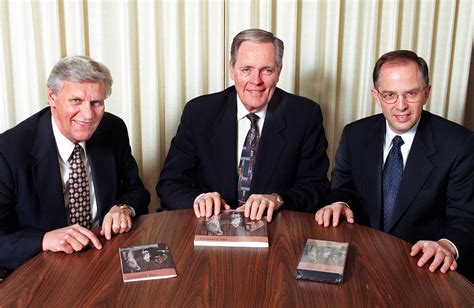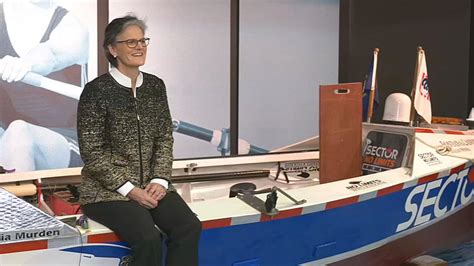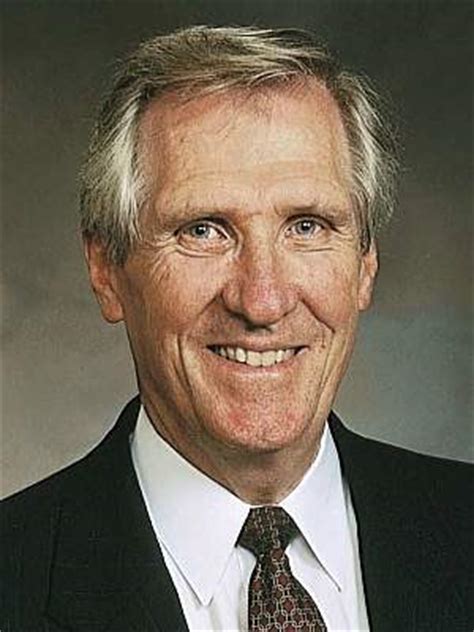A Quote by LaVell Edwards
How do we handle adversity? Adversity is going to be with us in everything that we do, almost in every facet of our lives-in our personal associations, in the mission field, in our chosen professions, in our families.
Related Quotes
Into each of our lives come golden moments of adversity. This painful friend breaks our hearts, drops us to our knees, and makes us realize we are nothing without our Lord and Savior. This friend makes us plead all the night long for reassurance and into the next day and sometimes for weeks and months. But, ultimately, just as surely as the day follows the night, as we remain true and faithful, this strange friend, adversity, leads us straight into the outstretched arms of the Savior.
Highly competitive athletes like Ginny Gilder have a gift for tolerating pain and ignoring adversity. They accept these things as the price they pay for greatness. These habits of mind and body serve us well in many aspects of our lives, but not in all aspects of our lives. Course Correction is about taking time to heal and exploring the joy that lies beyond adversity.
ADVERSITY CAN DISTRESS US OR BLESS US The way we use adversity is strictly our own choice, For in God's Hands adversity can make the heart rejoice - For everything God sends to us, no matter in what form, Is sent with plan and purpose for by the fierceness of a storm The atmosphere is changed and cleared and the earth is washed and clean.
One thing we may be sure of, however: For the believer all pain has meaning; all adversity is profitable. There is no question that adversity is difficult. It usually takes us by surprise and seems to strike where we are most vulnerable. To us it often appears completely senseless and irrational, but to God none of it is either senseless or irrational. He has a purpose in every pain He brings or allows in our lives. We can be sure that in some way He intends it for our profit and His glory.
To derive the fullest comfort and encouragement from Romans 8:28 we must realize that God is at work in a proactive, not reactive, fashion. That is, God does not just respond to an adversity in our lives to make the best of a bad situation. He knows before He initiates or permits the adversity exactly how He will use it for our good.
Our Heavenly Father has organized us into families for the purpose of helping us successfully meet the trials and challenges of life. The home also exists to bless us with the joys and privileges of family associations. Our family is our safety place, our support network, our sanctuary, and our salvation.
Dealing with adversity is like preparing for surgery. By putting our faith in what the doctor has said, we believe we will be better off if we have the surgery. But that does not make it any less painful. By submitting to the hand of a surgeon, we are saying that our ultimate goal is health, even at the cost of pain. Adversity is the same way. It is a means to an end. It is God's tool for the advancement of our spiritual lives.
Our struggle to put first things first can be characterized by the contrast between two powerful tools that direct us: the clock and the compass. The clock represents our commitments, appointments, schedules, goals, activities - what we do with, and how we manage our time. The compass represents our vision, values, principles, mission, conscience, direction - what we feel is important and how we lead our lives. In an effort to close the gap between the clock and the compass in our lives, many of us turn to the field of "time management."
Adversity is a severe instructor, set over us by one who knows us better than we do ourselves, as he loves us better too. He that wrestles with us strengthens our nerves and sharpens our skill. Our antagonist is our helper. This conflict with difficulty makes us acquainted with our object, and compels us to consider it in all its relations. It will not suffer us to be superficial.
It teaches us how to run our lives individually. How to run our families, how to run our churches. But it teaches us how to run all our public policy and everything in society. And that's the reason, as your congressman, I hold the Holy Bible as being the major directions to me of how I vote in Washington, D.C., and I'll continue to do that.
It's so easy in life for us to receive blessings, many of them almost uncounted, and have things happen in our lives that can help change our lives, improve our lives, and bring the Spirit into our lives. But we sometimes take them for granted. How grateful we should be for the blessings that the gospel of Jesus Christ brings into our hearts and souls. I would remind all of you that if we're ever going to show gratitude properly to our Heavenly Father, we should do it with all of our heart, might, mind, and strength-because it was He who gave us life and breath
No adversity is in kind or degree peculiar to us; but if we survey the conditions of other men (of our brethren everywhere, of our neighbours all about us), and compare our case with theirs, we shall find that we have many consorts and associates in adversity, most as ill, many far worse bestead than ourselves; whence it must be a great fondness and perverseness to be displeased that we are not exempted from, but exposed to bear a share in the common troubles and burdens of mankind.
We've sweated and torn out our hair trying to reconstruct our chosen lives, to fashion them like literary sculptures, at once monumental and yet human. We've applied all of our intelligence, our empathy, our critical faculties, our compassion - and we think, in our delusion, that it's still 1960, and our work is going to get noticed.





































